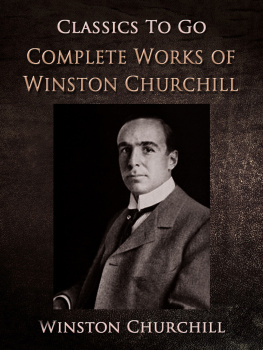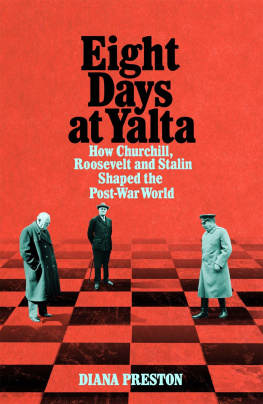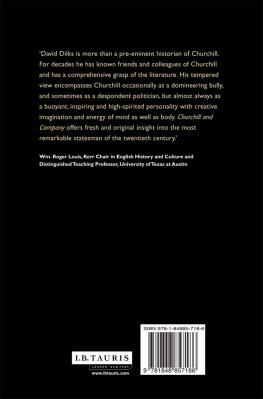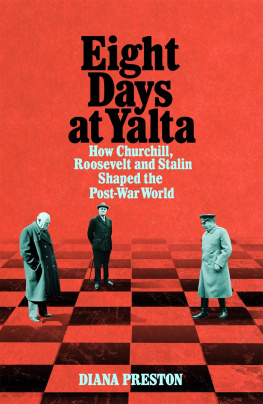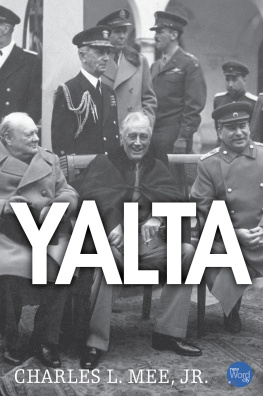The Iron Curtain
The Iron Curtain
CHURCHILL, AMERICA, and the ORIGINS of the COLD WAR
Fraser J. Harbutt

Oxford University Press
Oxford New York Toronto
Delhi Bombay Calcutta Madras Karachi
Petaling Jaya Singapore Hong Kong Tokyo
Nairobi Dar es Salaam Cape Town
Melbourne Aukland
and associated companies in
Berlin Ibadan
Copyright 1986 by Fraser J. Harbutt
First published in 1986 by Oxford University Press, Inc.,
200 Madison Avenue, New York, New York 10016
First issued as an Oxford University Press paperback, 1988
Oxford is a registered trademark of Oxford University Press
All rights reserved. No part of this publication may be reproduced,
stored in a retrieval system, or transmitted, in any form or by any means,
electronic, mechanical, photocopying, recording, or otherwise,
without the prior permission of Oxford University Press, Inc.
Library of Congress Cataloging-in-Publication Data
Harbutt, Fraser
The Iron Curtain: Churchill, America, and the Origins of the Cold War
Bibliography: p. Includes index.
1. Great BritainForeign relations1943-1946
2. Churchill, Winston, Sir, 1874-1965. 3. United States
Foreign relations1943-1946. 4. World politics1943-1946
1955. I. Title.
DA588.H27 1986 940.554 85-30972
ISBN 0-19-503817-7
ISBN 0-19-505422-9 (PBK.)
9 8 7 6 5 4 3 2 1
Printed in the United States of America
For Marysia
Acknowledgments
It is a pleasure to acknowledge my gratitude to those who, at different times and in varying degrees, helped me to write this book. They include the American historians, Diane Shaver Clemens, Lawrence W. Levine, Robert L. Messer, Michael Paul Rogin, Martin J. Sherwin, and James Harvey Young. On the British side I owe thanks to Martin Gilbert and Sir Frank Roberts for encouragement and assistance. The responsibility for the interpretations and any errors remains, needless to say, with me alone.
I record with appreciation financial grants from the Smith College faculty research fund and from the University Research Committee of Emory University. The patience and goodwill of individual librarians in numerous institutions, among them the National Archives and the Library of Congress in Washington, D.C., the Roosevelt and Truman presidential libraries, and the Public Records Office in London, was immensely helpful. Patricia Stockbridge typed the manuscript and various amendments with cheerfulness and professionalism. My sincere thanks to all.
I am especially beholden to two people. One is my agent, Gerard McCauley, who gave indispensable practical assistance. The other, to whom I feel a deep sense of gratitude, is Sheldon Meyer, Senior Vice President of Oxford University Press, who edited the book and was encouraging and constructive throughout. A first book on a controversial subject must be a somewhat speculative venture, even for an editor of this great experience and high distinction. No hint of this underlying truth, however, was ever conveyed to me. I must also thank all the other fine people at Oxford University Press for their contributions, with special mention of Leona Capeless, the considerate Managing Editor, and Otto Sonntag, whose excellent copyediting saved me from many errors.
My deepest obligation is to my wife, Marysia, whose sustaining affection, generosity, and good nature have allowed me to realize a long ambition. In what cannot be more than a token recompense, I dedicate the book to her.
Atlanta, Georgia
F.J.H.
June 1986
Contents
Introduction
This book is, in one sense, a biography of Winston Churchill in his role as the most active protagonist of a joint Anglo-American political front against the Soviet Union during and immediately after World War II. It is a subject of considerable interest, for it displays Churchill embroiled in the most consistent antagonism of his long career. It is also a story of repeated failure suddenly redeemed by a conclusive, dramatic triumph. My purpose is not, however, exclusively biographical. Indeed, the study of almost any aspect of Churchills career seems to lead one inexorably toward questions of broad significance, so closely connected was he with the profound events of our century. This is certainly true of the origins of the Cold War. Here, as we explore his thought and action, we will find both a distinctive angle of vision and a personal impact that was, in certain respects, decisive.
Surely the United States has never had a more persistent courtier than Churchill. He was active in the British effort to bring America into belligerency against Germany in World War I and again, as Prime Minister, in World War II. His initial efforts to create an Anglo-American front against the Soviet Union also go back to the first great conflagration. His reaction to the 1917 revolution was bitterly hostile. He quickly established himself as his countrys leading anti-Bolshevik, defining the new regime in Russia as Britains primary future antagonist and, even before the Armistice in November 1918, talking about the need to build up the defeated German army against this new menace. During 1919 he vigorously directed the British intervention in Russia and enthusiastically defended the use of gas against revolutionaries he seems to have regarded as subhuman. Meanwhile, he tried to draw the United States more fully into the military confrontation with the Soviets. President Woodrow Wilson, however, proved unresponsive. Churchill, deeply disappointed, did not give up. As late as 1931 we find him touring the United States and warning audiences that the two great opposing forces of the future will be the Englishspeaking peoples and Communism.
Through most of the interwar period, Churchill conducted a personal campaign against the Soviet regime that included the approval of fascism as a necessary European antidote. The appearance of a renewed German menace in the mid-1930s, however, inspired second thoughts. He now accepted the Soviet state as a necesary fixture. There was then a considerable further mellowing with the responsibility of supreme leadership in Britain during the war that followed. He formed a personal bond of sorts with Joseph Stalin and even collaborated with him briefly in a plan to divide postwar Europe. But, as we will see, the old hostility remained just beneath the surface, and Churchills postwar hopes, for the most part, centered on the notion of a dominant Anglo-American military and economic combination confronting a petitionary Soviet Union. Here again, though, except briefly in 1945, he was successively rebuffed by Presidents Franklin D. Roosevelt and Harry S. Truman. Only in the crisis of early 1946, when a sudden reorientation in American policy led to the Cold War, was he finally and completely successful.
In that transformation Churchill took a leading part. The most obvious manifestation of this was his iron curtain speech on March 5, 1946, at Fulton, Missouri. There, for a moment, the twentieth century was reduced to the dimensions of Periclean Greece, as the famous orator brought together the two themes that had dominated his political outlook for nearly three decadesfear of Soviet Russia, belief in a countering Anglo-American missionat precisely the moment when much of the world was poised receptively in uneasy, halfconscious transition to a new international system based on that very proposition. But Churchills contribution to the transformation went far beyond the Fulton speech itself. Indeed, as we follow the course of events and try to understand the political relationships and perceptions involved in this crisis, we will find that he exerted considerable influence upon both the American reorientation and the Soviet response.
Next page

